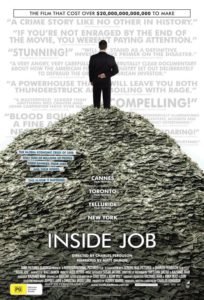The global financial crisis, as it has grown to be called, is said to be the worst financial crisis the world has seen since the Great Depression of the 1930s. The crisis cost over $20 trillion, along with the loss of millions of jobs and homes. Yet while that era immediately raised the public consciousness with a number of great films on the subject – most notably It Happened One Night (1934), Mr. Deeds Goes to Town (1936), the sublime Sullivan’s Travels (1946) and of course, It’s a Wonderful Life (1946) – we are yet to see the great financial crisis film of our time.
Documentarian Michael Moore took his typically personal approach to the financial crisis in Capitalism: A Love Story (2009), trying to work out how things like sub-prime lending led to the collapse of not only banks, but people’s lives as well. Oliver Stone even returned to his great creation of the ‘Greed is good’ 1980s, with the lacklustre Wall Street: Money Never Sleeps last year.
Charles Ferguson had previously grabbed attention with the multi award-winning 2007 documentary, No End in Sight: Iraq’s Descent Into Chaos. With Inside Job, Ferguson turns his critical eye on the root causes, ongoing issues and future consequences of the global financial crisis. Narrated by Matt Damon (Hereafter), the film paints a picture of a crisis that was completely avoidable. Although the reasons for the meltdown were many, Inside Job focuses on the increased deregulation of the financial sector over the last three decades – from the beginning of the Reagan era, through uncontrolled mergers and laws banning the regulation of derivatives – and the rise of securitisation of mortgages and speculative credit swaps. (It might be easier to go look that up than have us explain it to you). Via interviews with a number of politicians, market analysts, financial bigwigs and academics, we get to see a level of corruption and out of control behaviour that threatens to undo capitalism itself.
For the size of the global financial crisis, very little has been said about it until recently. Sure, you couldn’t turn on the television or read your news feeds without hearing about the collapse of a bank, or which European country was about to be consumed by a black hole of debt, but the fundamental questions about what caused the crisis and why weren’t the warning signs heeded. Indeed, with bailouts successfully passed, there has been no reappraisal of regulatory laws or unconscionable practices that led to the crisis in the first place. It is, for most big firms, business as usual. Although the concepts of mortgage-backed securities are complex, and viewers of Capitalism: A Love Story may have already had their CDOs 101 lessons, these are only the merest surface level of the intricate web of perfectly legal corruption that continues to this day. The film competently explains, and more importantly keeps the audience engaged, via a series of helpful graphics and talking heads who cooperate at varying degrees.
The film is at its strongest when it ably dissects and connects the superficially disparate issues that range from Iceland’s financial crisis to the problems in the US, putting a number of the aforementioned talking heads on the ropes, ducking and weaving to avoid any personal culpability. What may surprise some viewers, this reviewer included, are the number of levels of society that influenced the crisis. For example, Larry Summers – who as Treasury Secretary was crucial to the deregulation of derivatives – became President of Harvard in 2001. During this time, he made millions consulting to hedge funds and in speaking fees, much of it from investment banks. Harvard, as the film points out, does not require disclosures of financial conflict of interest in publications.
At its weakest, Inside Job attacks the illegal practices and sociopathic behaviour of the executives, who are said (according to a high-class call girl) to go to strip clubs, use cocaine and prostitutes on company accounts. Yet it is the perfectly legal behaviour that these corporate risk-takers engage in that is the most worrying moral of this true tale, with those activities remaining unchecked on this side of the ongoing crisis.
The Reel Bits: A well-constructed, engaging and thoroughly holistic examination of the recent financial crisis, with frightening possibilities still to come.
Inside Job is released on February 17, 2011 in Australia by Sony Pictures Entertainment..







No Responses